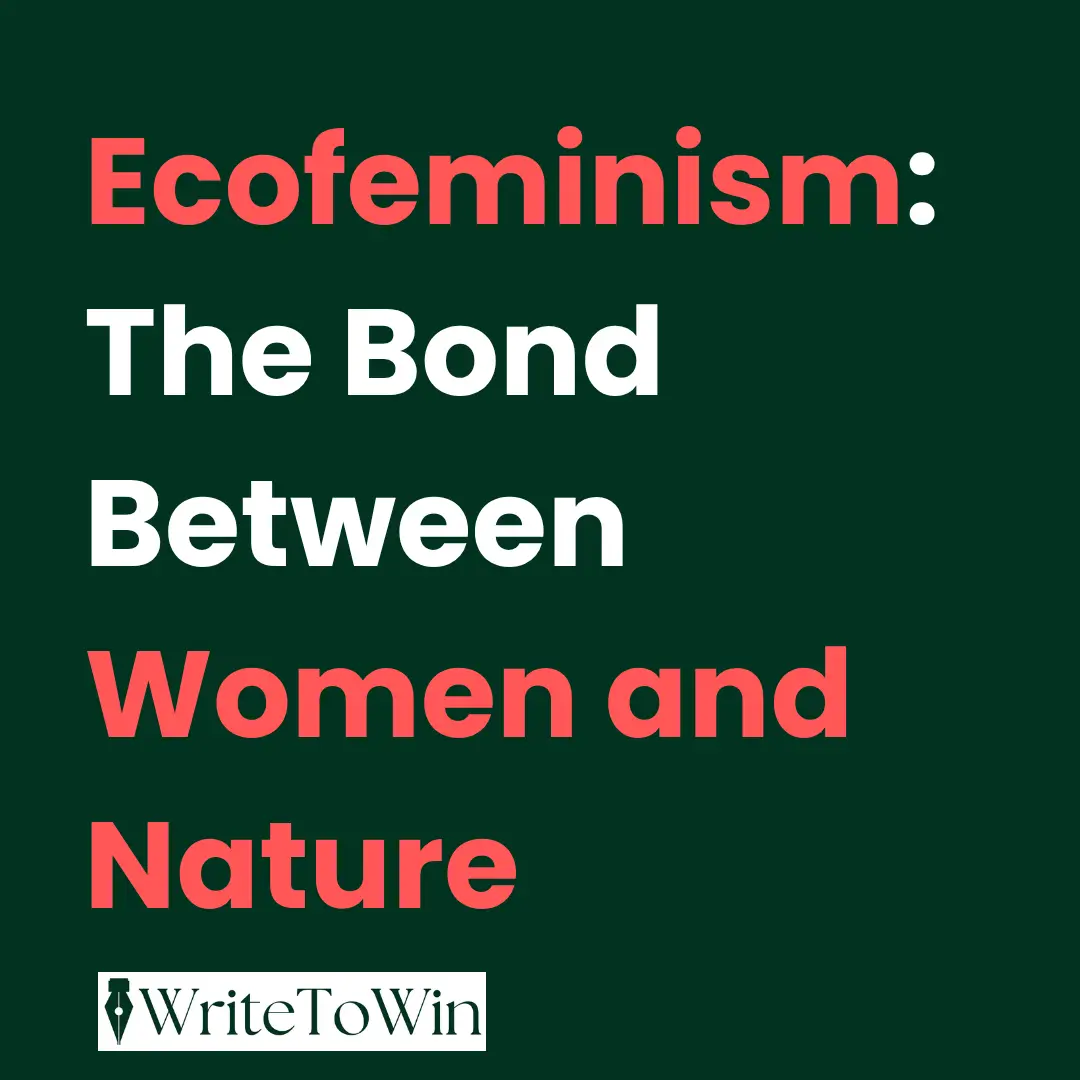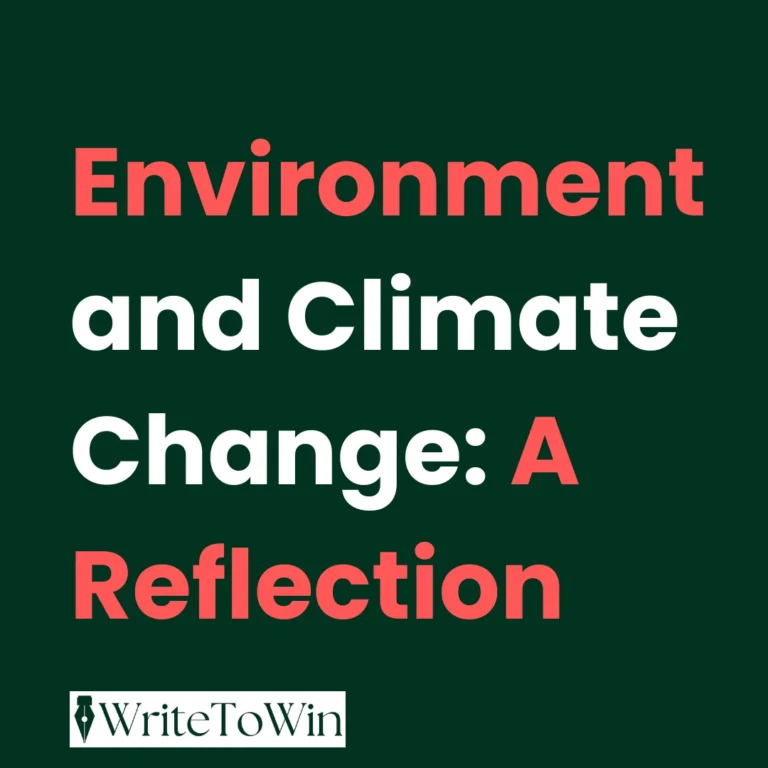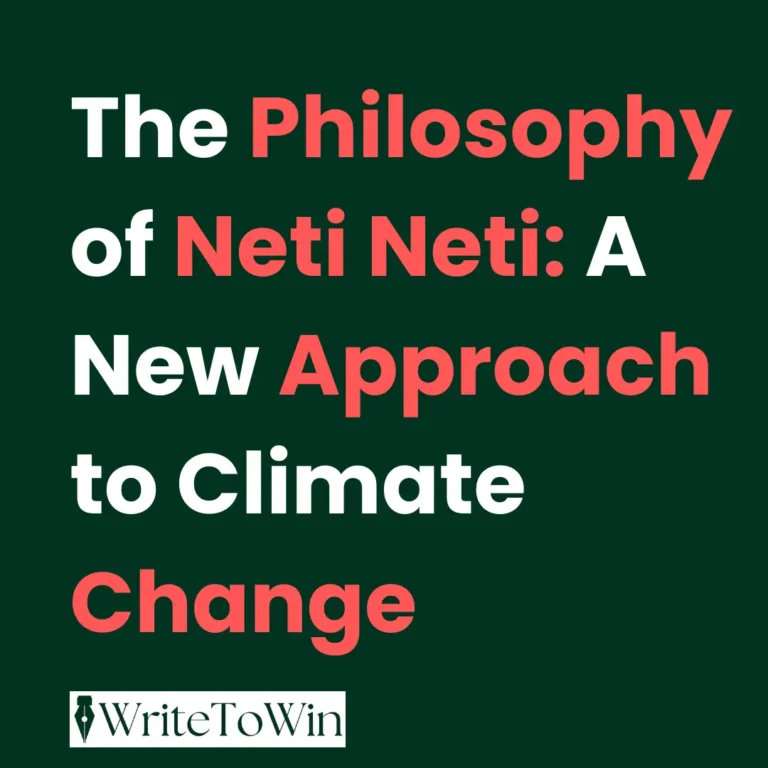Eco-feminism is not just a framework or concept; it is the ambition of all those known and unknown heroes who sacrificed their life and spent most of their lifetime working for the sustainable development of the environment, along with the rights of women. This paper analyses the origin and development of Eco-feminism along with its challenges and present-day scenarios.
Further, the important aspects like eco grief, eco guilt and deep ecology are extensively discussed. The paper examines the evolution of various ecofeminism theories and their diverse sphere, including social, economic as well as ecological. Furthermore, various ecofeminist movements from around the world have also been discussed in this paper.
Additionally, the contemporary application of feminism in climate change, food production, education and gender access to modern technology has been explored. Ultimately, Eco feminism has been presented as a solution to gender equality and the deteriorating relationship between humans, nature and animals.
Introduction
Ecofeminism is a step or an awareness towards women encouragement and giving them a respectable position in society that they truly deserve by linking them with nature. This concept is the third layer of feminism. This topic is something that is not so popular because people are too busy presenting feminism only at the political and economic levels.
The truth is bitter, but the reality is that nowadays feminism has become a tool for gender-based manipulation. The idea of ecofeminism has always been since ages. In India, nature has always been a mother figure, often called Shakti or Bhumi, the feminine power that nurtures each and every living organism and similarly, in Greek Gaia is the mother of all creation.
There are many countries which worship nature as a mother figure, but after colonialism and westernisation, the concept of patriarchy and capitalism evolved, which became the root cause of the suppression of both female and nature.
The man blinded by greed exploited nature, extracted all the resources with no concern for sustainability, and razed all the forests to create factories that are now spreading like a disease, polluting the environment. The men have misused nature and have created a world rooted in domination and control.
This very mindset to control everything gave rise to patriarchy, women became subject to violence, an object to men, their roles being reduced to that of a housewife and their life being confined to four walls. Ecofeminism connects both women and nature by delving deeper into the chaos and gender injustice done by the powerful.
Though the 21st Century has somewhere given rights to women but still when it comes to wages, workplace opportunities, domestic roles and succession, it is the man who enjoys the power while women continue to be denied equal access and recognition.
This paper aims to explore the lesser-known dimension of ecofeminism and will shed light on issues that have received limited attention. It will also analyse the relevance of ecofeminism in the contemporary context.

Historical Background
The term ecofeminism was first coined in 1974 by the French feminist Françoise d’Eaubonne. Mother of Ecofeminism. She was born in 1920 and was a social activist and a member of the French Communist Party.
According to her, ecofeminism was the only solution for the two major dangers of the world: population growth and the destruction of the environment, both with a common root in phallocracy-a society dominated by men.
She considered that men have taken control over the soil, its fertility, as well as the fecundity of a woman. Since then, numerous additions have been made to the theory of ecofeminism.
Ecofeminism was further developed by Ynestra King in about 1976 and became a movement in 1980, and, in the same year, the first ecofeminist conference –“Women and Life on Earth: Ecofeminism in the 80s” was held at Amherst, Massachusetts, US (Spretnak 1990).
The conference discussed the relevance of feminism in connection with militarism, health and ecology. In 1993, Ynestra King wrote an essay titled “What is Ecofeminism”, where she quoted “Ecofeminism is about connectedness and wholeness of theory and practice… (it sees) the devastation of the earth and her beings by the corporate warriors, and the threat of nuclear annihilation by the military warriors as feminist concerns.
It is the same masculinist mentality which would deny us our right to our own bodies and our own sexuality and which depends on multiple systems of dominance and state power to have its way”. Throughout the wheel of time, many women took initiative and led the revolutionary movements to protect the environment.
The famous Chipko Andolan (Hug The Trees Movement) of Uttarakhand inspired the villagers of Uttara Kannada district of Karnataka to launch a similar movement in order to save their forest, this movement was called Appiko Andolan, which meant hug the trees in Kannada.
The government here declared this area backwards and started deforestation in order to develop the area by building industries. The three major industries were a pulp and paper mill, a plywood factory and a chain of hydroelectric dams. These three industries, which were made for human development, became the root cause of environmental degradation and deforestation.
As a result, the forest area shrunk to nearly 25% of the district’s total area. In order to save the natural habitat, women and children came together and protested. The movement’s popular slogan was “save, grow and use rationally’’ which showed the connection of locals with nature.
In 1977 in Kenya, Wangari Maathai, a renowned social activist ahead of her time, started ‘The Green Belt Movement’ at the grassroots level. She encouraged women to plant more and more trees in order to combat soil erosion, deforestation and water scarcity.
As a result of this movement, over 50 million trees were planted in Africa. Wangari observed that before colonialism, Kenya was characterised by a large amount of green forest and wildlife, but after colonialism, the situation completely changed as the forests were ravaged and the natural resources were plundered.
The exploitation of the forest completely changed the wildlife and the natural habitat of the locals, as well as the animals. Therefore, she came up with this idea in order to promote sustainability and women’s empowerment. She proved that women have the capacity and potential to heal the ecosystem.
Unsung Ecofeminists
Every revolution has a struggle behind it, and behind every struggle, there is a story, and in these stories, there are some unsung heroes who are forgotten by the world.
Berta Isabel Caceres Flores (1971-2016)
Berta was a Honduran environmental activist and an indigenous activist who embraced the principles of ecofeminism. She co-founded the Council of Popular and Indigenous Organisations of Honduras (COPINH) in 1993, advocating for indigenous rights and environmental protection.
She led a grassroots campaign against the Agua Zarca Dam on the Gualcarque River, a project that threatened the livelihood and ecology of the Lenca community. Her fierce determination pressured the world’s largest dam builder to terminate its project, earning her the Goldman Environmental Prize in 2015. Unfortunately, in 2016, she was assassinated by hired hitmen after years of threats.
Suryamani Bhagat
Suryamani Bhagat was one of the leaders of Jharkhand Jangal Katai Andolan, and it was her negotiation and protest with authorities that led to the passing of the Forest Act in 2006. She was born in a poor family in the village of Kotari.
Despite being poor, she somehow managed to get a degree in Sanskrit and became a teacher, but later, due to her interest towards environmental sustainability, she left her job and became a full-time activist.
In the year 2000, she established Torang, a centre dedicated to protecting the rights and livelihood of indigenous and tribal people. Her work highlights environmental justice and women’s rights.
Maria Elena Moyano Delgado (1958-1992)
Maria was an Afro-Peruvian community organiser, feminist, and human rights activist. Though she did not label her as an ecofeminist, her work embodies the principles of ecofeminism. She co-founded the Federación Popular de Mujeres de Villa El Salvador (FEPOMUVES), which focused on women’s leadership in community development.
The organisation initiated environment-friendly and gender access projects like communal kitchens, health committees, and educational programs, addressing both social and environmental issues. She also promoted sustainable practices like urban agriculture and afforestation.
Later on, she was assassinated by Shining Path, a Maoist guerrilla group in Peru, in front of her family, and her body was dragged to the nearest town and was blown up with dynamite. This assassination was a result of Moyano’s criticism of Shining Path tactics and their domination over poor communities.
Eco Grief And Eco Guilt
Eco grief is a psychological consequence of ecological atrocities that creates distress among people. Research has shown that climate change has an adverse effect on mental health, especially for women, as they tend to be more protective towards their family.
Similarly, eco guilt is the feeling of remorse among individuals as they know their actions are degrading their environment. Many urban women feel guilty using plastic in daily situations, like while packing food or while using sanitary napkins.
Though we have substitutes for plastic but they cannot be afforded by everyone. From the perspective of a woman, eco guilt is something that affects their mental health.
A recent study conducted by the Society for Maternal-Fetal Medicine found that microplastics have been found in higher concentrations in the placentae of infants born prematurely compared to those born at term.
The guilt of knowing that your child will be born in a world where carbon emissions have exceeded, water has been polluted, and the quality of air has decreased drastically is devastating. Addressing the environmental crisis is not only a scientific issue but a moral issue, too.
To overcome this guilt, we should not ignore it just like most people do; they just dump the garbage as they want, and if someone objects to their action, their ego gets hurt.
The gender gap is also the main reason for eco grief and eco guilt, as many rural women do not have access to clean energy technologies like liquified petroleum gas or solar panels.
These women spent half of the day in the forest collecting wood for cooking; they also use charcoal, which results in the emission of carbon. These constraints compel women to use the primitive tools, which often leads to climate change.
Eco Feminism And Climate Change
Eco feminism and climate change are connected to each other as both are results of domination. Whenever there is a famine, a tsunami, or any other climate change, it is the women and girls whose chances of survival decrease.
Whenever there is a problem in a family, it is the girl who is expected to help the mother and look after the household. It has been found that in areas of extreme climate change, the exploitation of women increases, and some of them become victims of child marriage, early pregnancies and human trafficking.
The Gender Snapshot 2024 report indicates that by 2050, climate change may push up to 158 million more women and girls into poverty (16 million more than the total number of men and boys). Even today, 47.8 million more women face food insecurity and hunger than men.
If women would be given equal opportunities as men, then they could take a stand for themselves. A woman understands nature better than a man; she can feel the vibration and energy of nature.
Climate change does not confine women to their households, and in order to earn money for the survival of the family, they are often sold away by their families. Women can play a crucial role in responding to climate change due to their undervalued knowledge and sustainable household and resource management skills.
In many developed and developing countries, women’s inclusion in leadership posts has improved climate-related policies and projects. In Uruguay, a gender responsive monitoring, reporting and verification system has been established to track the implementation of Nationally Determined Contribution (NDC) programming in supporting women’s empowerment.
Empowering and investing in women can help in combating the effects of desertification and alleviating the poor; however, women do not have sufficient funds to cover climate-related losses or to use modern mitigation technologies, which are used to curb or restrict greenhouse gas emissions from human activities, to showcase their capabilities and talents.
Challenges To Ecofeminism
Misunderstanding and Misrepresentation
Recently, the layer of feminism has spread everywhere, and some women took this to an extreme form by playing the victim card. These so-called feminists who lack the understanding of true feminism have cast the movement in a negative light.
As a result, some people have grown sceptical of feminism and now view ecofeminism as another excuse for women to gain sympathy or manipulate men under the disguise of Gender Equality.
Global North and Global South
The difference between the global north and the global south poses another major challenge to ecofeminism. The global south is considered to be backwards than the global north. The Global North consist of developed countries, which are responsible for most of the environmental pollution.
These countries are capitalist-minded and view ecofeminism as a critique of them. The Western feminism framework may not always align with those of the global south due to cultural differences, which often lead to cultural imperialism and a superiority complex.
Gender Marginalization
The society has pushed the situation of women to extremes by exploiting them and curbing their voices. People have the perspective that women living in rural areas are backwards and illiterate, so it is useless to give them a platform to share their knowledge and experience. This is also one of the main reasons why rural women are not involved in policy or decision-making at both the national and international levels.
Why Should We Support Ecofeminism
We should support ecofeminism because it is the need of the hour. It is true that some of the females living in rural areas are illiterate, but that does not mean they are uneducated. Education is not just confined to books and classrooms – it can also be gained from life experience and personal wisdom.
A female farmer who never went to school possesses deep knowledge about the species of crops, the period of that crop and is also aware of the exact quantity of water that the plant needs. She is well aware of the agricultural patterns and techniques.
She knows this not because she went to school or some other fancy institution, but because she learned it from her surroundings and elders. We often underestimate the knowledge of women and undervalue them, especially when they are villagers.
Today, when the world is rediscovering Ayurvedic treatment, we must remember that this ancient practice or treatment has been followed by these women for ages and has been passed down from generation to generation.
Ecofeminism can also increase food production, the lack of which leads to migration or desertification. According to the Food and Agriculture Organisation, over one-third of the women in the world are employed in the agricultural food system, and they are paid nearly 20% less than male workers.
Women working in the industries endure a heavy burden as they manage both their household as well as labour work; not only is their wage low, but also the environment in which they work lacks basic reproductive sanitation care. Ecofeminism often uses traditional approaches like crop rotation and the use of natural pesticides.
These traditional practices, when combined with modern technology, can lead to a more resilient and productive food system. It also balances ecological sustainability. Nowadays, most ecofeminists have started adopting a vegan way of living, which not only preserves the environment but also protects biodiversity.
Ecofeminism encourages women to empower and demand equal gender access to energy resources, and it also raises the voice of women at the grassroots as well as the international level.
Moreover, it creates self-realisation among village communities the helping them realise their actual potential. It is a powerful shield against capitalism and a deeply rotten patriarch that always tries to assert its dominance over nature as well as women.
Ecofeminism also talks about deep ecology, according to which we are a part of the larger environment, and men can never control it. It emphasised that every human and non-human has value and humans have no right to destroy these values and richness in diversity, they have the right to use this richness and resources only for their survival.
Conclusion
As the world is developing, it is important that the development should be for all non-human and human, especially for women, because the living representation of nature. For a long period of time, these women were exploited and violated.
Ecofeminism is a concept that challenges the patriarchal and capitalist system that is the root cause of oppression and violence against women and nature. It gives women the status they truly deserve at both the grassroots as well as international levels.
It encourages women to realise their potential and take part in policy and decision-making. Ecofeminism calls for a world with sustainable development goals and respect for traditional as well as moral values.
It also deals with the concept of eco guilt and eco grief and compels a person to think about the environment so that the next generation can be born in a healthy and peaceful environment.
Though there are many challenges that prevent this concept from spreading, there is still hope for a future where this topic is widely accepted with love and purity.

She shares a deep connection with nature like an old friend. Nature gives her inspiration that shapes her thoughts and fuels her words. Through her writing, she enjoys exploring lesser-known and underrated topics about nature that often go unnoticed, urging people to see, feel, and protect the nature that sustains us. Her work aims to inspire readers to reflect on their connection with nature and contribute to making this world a better place to live.







